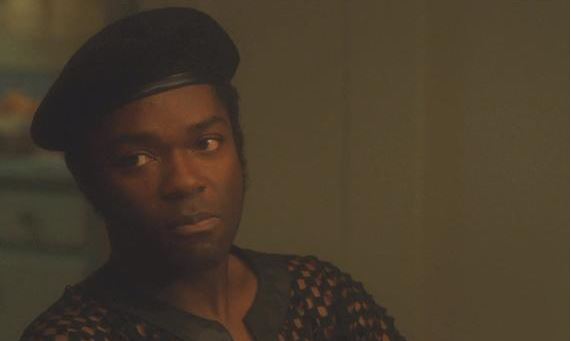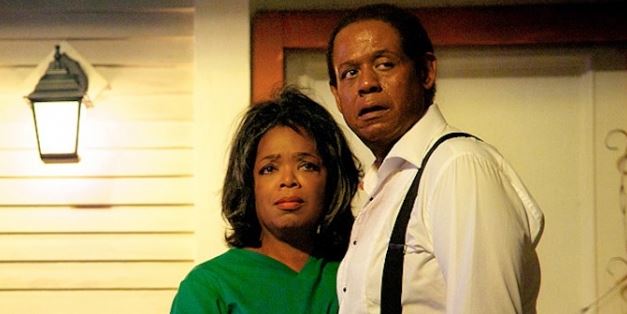Review: THE BUTLER Serves Up A Civil Rights Saga For The Ages

Lee Daniels’ The Butler — ****
In Lee Daniels’ The Butler, Forest Whitaker plays Cecil Gaines (Forest Whitaker), a black man who has served white Presidents as a White House butler through the most tumultuous era in the 20th century. And as Gaines explains it, black domestic help had two faces, the one put on in front of the people he or she was serving and the one worn behind the scenes.
That idea is what makes The Butler a quietly revolutionary film. Most movies about that deal with racial politics have only put on one of two faces. There’s the face for white people, one where black people exist through their relationships with whites, both good and evil. (In the Heat of the Night, Guess Who’s Coming to Dinner, Ghosts of Mississippi, etc.) And then there’s the behind the scenes face, the one told predominantly from an African-American perspective. Movies that fall into the second category, while important for breaking down barriers, are rarer because they have such a tough time making it with mainstream white audiences. (Spike Lee’s indies, Boyz n the Hood, Killer of Sheep, etc.)
In The Butler, we see both faces at once, quite possibly for the first time. Lee Daniels has never been afraid to show ugly truth alongside life’s beautiful moments. He understands the contradictions that make up the human experience. With The Butler, Daniels combines a family melodrama with a civil rights saga and exposes the complexity of all people of the era. That he knowingly tells the story of an African-American family with historically white genre clichés gives the film its punch.
I say “knowingly” because Daniels has played on the clichés of the genre he’s working in to hammer home the emotional moments. A lot of people will see this as a flaw, an easy way out, rather than a conscious choice. When the Gaines family sits down to dinner with a son (David Oyelowo) who returns home as a Black Panther, we see a scene that has played out of over the years with so many white families: The father who disagrees with his child’s politics and a child who goes his own way. But the fact that it’s a black family fighting over one’s approach to civil rights changes the way the scene is received in spite of its hackneyed structure.

That scene is one of my favorites. It provides you with the most insight into what Daniels accomplishes with The Butler. Cecil’s wife Gloria (Oprah Winfrey) brings up Sidney Poitier and the movie In the Heat of the Night. The family argues over Sidney Poitier playing a white man’s fantasy of a black man, while at the same time becoming the first black person to win the Best Actor Oscar. And we know no matter what Poitier did, his race was front and center.
Race still matters in America and Hollywood, even 50 years after Poitier’s Oscar win. Trayvon Martin, Paula Deen and the Tea Party Movement prove that easily. Daniels never runs away from that idea like so many movies about racial politics that want us to believe something has been settled. But Daniels doesn’t charge toward the idea either. It’s there, as part of this family’s story. And the unique position of this family makes telling that story even more impactful.
Cecil Gaines, in his effort to be invisible, often heard the best and worst of the presidents he served. As another butler, Carter (Cuba Gooding, Jr.), points out during LBJ’s (Liev Schrieber) civil rights speech, that president said the N-word more often than he did. And though even this reviewer thinks the Ronald Reagan (Alan Rickman) was a monster, I appreciated that Daniels showed Reagan’s concern over his own civil rights legacy.
You see these white guys exist through their relationship with their black bulter which flips what we historically know about race in film. And it shows that, like everyone in America, these men juggled conflicting thoughts and actions. There’s an honesty in that approach that is rare in any film, let alone movies like The Butler.
Are there mistakes and missteps along the way in The Butler? Yes, but the brilliant successes I mention above make up for anything that goes wrong. Two more of those successes can be found in the performances of Forest Whitaker and Oprah Winfrey.

As Cecil, Whitaker’s quite deference cloaks the scars of a man who has seen the injustices of pre-civil rights America firsthand. When that exterior is breached, Whitaker brings the fiery energy that we saw in his Oscar-winning role as Idi Amin in The Last King of Scotland.
Oprah, however, gives the film’s most spectacular performance. As Cecil’s the alcoholic philandering wife, Oprah’s role is inherently showy but she doesn’t overplay her hand. She melts into the role of Gloria at every step of the way, even when Gloria’s on the wagon. Daniels appears to favor the primary supporting actresses in all of his films (Mo’Nique and Nicole Kidman, for example). The attention he gives Oprah and the complexity she exhibits are sure to make her the odds on favorite to win the Oscar.
Both Oprah and Whitaker grow old together in the movie as Gloria and Cecil. And the film concludes with Cecil, now retired, seeing Barack Obama become the president. It’s a moment that will bring you to tears. Afterall, this is a movie about race and one of the most significant moments in American racial history is Obama’s election. Seeing it through the eyes of this black husband and father who experienced the civil rights movement from within the White House heightens the emotion. That makes The Butler one of the year’s best—and most important—movies.
The Butler—starring Forest Whitaker, Oprah Winfrey and David Oyelowo, directed by Lee Daniels and written by Danny Strong—is now in theaters.











No Comments
Trackbacks/Pingbacks